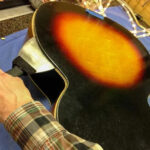Heritage Guitar Co. stands as a beacon of traditional guitar craftsmanship, revered for its “Golden Era” ethos and dedication to quality instruments. As Heritage Guitar Co. enters a new era under BandLab Technologies, questions arise about the future direction of this iconic brand. This piece captures the raw and honest perspective of a long-time dealer, grappling with disappointment and urging the new leadership to honor the heritage that defines Heritage Guitar Co.
For many within the guitar industry, Heritage Guitar Co. represents more than just instruments; it embodies a philosophy rooted in respect, integrity, and a deep appreciation for the craft. This sentiment is powerfully voiced by a dealer, identifying as a “rebel” with “Golden Era” values, who expresses a profound loyalty to the original spirit of Heritage. However, this loyalty is now being tested as Heritage navigates changes under new ownership. The core issue raised is whether the new management will truly understand and value the “heritage” in Heritage Guitar Co., or if they risk eroding the very foundations that made the brand respected in the first place.
The dealer’s candid statement reveals a significant concern: the potential clash between corporate strategies and the established values of Heritage. Having dedicated years of business to Heritage, this individual voices a growing disillusionment, stating, “I will no longer be spending $20-30k yearly with Heritage… Regretfully.” This is not simply a business decision; it’s a lament from someone who deeply respected the “Golden Era team” and feels that the new direction is incompatible with those values. The core grievance lies in the perceived shift away from a relationship-based approach to a more corporate, potentially impersonal model. The dealer emphasizes, “BEAN COUNTERS CAN BUY A BRAND NAME… THEY CAN’T BUY ME!” highlighting the importance of personal connection and mutual respect in business dealings, especially within the guitar community.
The critique extends to the very nature of the new ownership’s approach. The dealer points out the lack of “musician experience” within the new entity, questioning their understanding of the nuances of the guitar market and the needs of both dealers and musicians. This lack of understanding, it’s argued, leads to the imposition of business models that disregard the established ecosystem and the associates who have been crucial to Heritage’s success. The arrival of a new 49% owner further exacerbates these concerns, with accusations of “zero respect for the loyal associates.” This paints a picture of a company potentially losing touch with its core support base in pursuit of perhaps more financially driven strategies.
A direct address to Meng Ru Kuok, CEO of BandLab Technologies, forms a crucial part of this message. The dealer acknowledges BandLab’s ambition to deliver the “Best Brand” but cautions that true brand reputation cannot be bought or manufactured overnight. It must be “earned through your products, associate support, end user appreciation, artist support and your own ‘History of Earned’ respect.” This is a challenge to move beyond mere branding and marketing and to genuinely embody the values that resonate with the Heritage community. The dealer pointedly warns against becoming a “Henry J 2.0,” a reference understood within the guitar world as representing a certain corporate approach that prioritized profit over heritage and relationships – a path many fear for Heritage Guitar Co.
Despite the criticisms, there remains a core appreciation for the fundamental quality of “The Heritage” product. The dealer explicitly states, “There is nothing wrong with ‘The Heritage’ product, maybe you should try NOT to be Gibson, PRS, Collings or any other manufacturer. The Heritage IS enough for me….” This is a powerful endorsement of the guitars themselves and a plea to focus on the unique identity of Heritage, rather than attempting to emulate other brands. It suggests that the strength of Heritage Guitar Co. lies in its own distinct character and its adherence to its established quality and design principles.
However, significant concerns are raised regarding potential shifts in sales strategy, specifically the question of “direct sales to the End User” in the USA. The dealer warns, “Go ahead, disrespect your dealers!” highlighting the crucial role of the dealer network in the traditional guitar market. Direct sales models, while potentially lucrative, can alienate established dealer relationships and disrupt the existing market ecosystem. This point underscores the importance of considering the impact of new strategies on the long-term health of the dealer network, which has been instrumental in building Heritage’s brand and reaching customers.
In a final note of solidarity, the dealer declares support for those who have been “Fired,” stating “THEY DESERVE IT!” While seemingly contradictory, the context suggests this is support for those who were fired, implying disagreement with these personnel decisions and standing in support of individuals likely seen as part of the “Golden Era team.”
In conclusion, this dealer’s message serves as a critical yet ultimately hopeful appeal to the new leadership of Heritage Guitar Co. It emphasizes the irreplaceable value of the brand’s heritage, the importance of respecting dealer relationships, and the need to prioritize product quality and authentic brand values over purely corporate strategies. The challenge is clear: for Heritage Guitar Co. to thrive in this new era, it must not only preserve its legacy but actively nurture it, ensuring that the “Golden Era” spirit continues to resonate within the company and throughout the guitar community.

